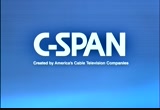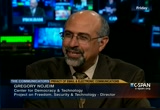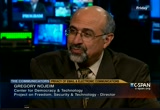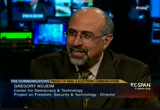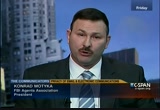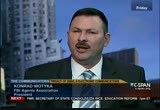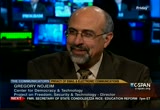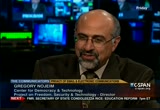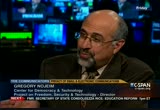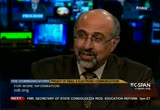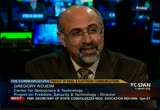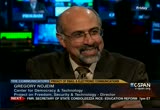tv The Communicators CSPAN December 1, 2012 6:30pm-7:00pm EST
6:30 pm
>> c-span, created by america's cable companies in 1979, brought to you by public service by your television provider. >> this week the senate judiciary committee approved changes to the electronic privacy communications act of 1986. this week we want to explore what those changes may mean to different groups. joining us this gregory of the center for democracy and technology. what is the current law when it comes to law enforcement and e- mails and cell phones? >> the short answer is that it is confused. for e-mail that is less than 180 days old, law makers need a
6:31 pm
warrant. for more than 180 days, it is just a subpoenas of there is no judicial intervention or high standard of proof. for documents to store in the clouds, that is also available with a subpoena. with cell phones there is the statutory provision. this has been in different places. they need a warrant. others say if it is gps location they need a warrant. there is not a clear role. >> what are the changes that the senate judiciary committee has approved? >> they focused on content of communications. they said it should not matter how old the content is. it should matter how you started with a service provider or that one.
6:32 pm
they said there should be a warrant required. they maintain the existing exceptions to the requirement in current law. if there is this, they are able to get a voluntary disclosure from the provider right away. >> what are your views on the changes made by the senate to judiciary committee? >> i think they did an excellent job. they have spent two years looking at this question. they have had multiple hearings. they have had many meetings with private advocates. they settle down on this one revision to the electronic communications privacy act. that law has been around since 1986. that is eons and internet years.
6:33 pm
in 1986 is 27 years old and has not had a significant privacy of grade since then. >> also joining us is konrad motyka, an fbi agent in the current president of the fbi agents' association. what is your view in the fbi association's view of the changes made to the 1986 law? >> as they made their way out of committee, and there is a lot of discussion going forward an acknowledgement that there are parts of the law that still need to be required for further refinement. these changes that have been proposed represent a very fundamental change in how these types of stored communications are accessed by law enforcement. there is a direct distinction between content that is fresher
6:34 pm
than 180 days in content that is older than 180 days. the proposed amendments do several things. for content that is older than 180 days, it increases the legal standard by which law enforcement can obtain the actual content, raising it from the standard of reasonableness to a standard of probable cause. a search warrant needs to be signed on by a judge. it also creates a presumption of disclosure. are nearly was search warrants there is a resumption of delay. we are concerned with some of the practical aspects and let it means to us in our daily work.
6:35 pm
when congress passed the administrative subpoena, they did that to have great inflexibility and agility and the ability to protect and defend the american public. some of these measures remove the flexibility aspect out of it. it makes our jobs more difficult. there has been that the need to be revised and nikolai before they passed the final version of the law. there is an emergency exception. it is strictly voluntary on the part of the service provider. it is not a requirement. because not every service provider at the same way, they asked to provide information.
6:36 pm
we feel this is not strong enough. this needs to be mandatory and codified into law. >> what is the significance of the 180 days? >> is not something that law enforcement proposed. this is a somewhat arbitrary cut off part regarding whether the e-mail content could be considered recent or something that was older. >> you were just saying that you have some concerns. i was wondering specifically what you had seen changed and what provisions should become
6:37 pm
log? >> i am concerned that in its present form the amendments and not seem to take law enforcement concerns an account at all. there was some distinction drawn. they did drop a distinction. as i said, these are the emergency provisions. not every service provider groups this in a similar fashion. that is first and foremost. there also should be a production component. right now there's not anything that specifies how quickly the
6:38 pm
service provider needs to respond. that is something that should be addressed. its search warrants are adopted across the board, it would be treated at the same way as other point of intersection under title 15. >> i am wondering why there should be a distinction but you'rewide between the wall wors with things that are physical. what the bill does is against the same profession for e-mails -- protections for e-mails than it does at home. be sufficient?is >> if you look at how a search warrant is handled by the courts
6:39 pm
for the physical feature of property, the affidavit can be sold by the court. it can be accompanied by an nondisclosure level. it delays the notification for such time until the investigation is concluded. that is for very good reason. it is not just the individual agents. there is court oversight. the warrants are issued by the court. what the amendments do is they change the perception of delayed to the presumption of notification by saying that would then see days disclosure must be made unless a court
6:40 pm
order is applied for and 90 days segments. the concern is why change something that has worked very well that has protected the integrity of the investigations one there is no enforcement. doubt that it changes to how we act currently. i think a lot of what has been proposed as the to the end vantage of law enforcement. >> i think we need to understand a little what he is doing. first, a lot of the disclosures
6:41 pm
are made with a subpoena. that means there is no judicial review. the subpoena process requires they give you notice. you have to have notice when that disclosure is made. there is a provision that allows law enforcement to get an order delaying know this. what lay he did -- but he did was say we're going to a warrant standard. had we maintain that role? we are going to keep it where it is. and not think we're moving a lot there. the warrant can be delayed for double. that is at the disclosure. the double digits.
6:42 pm
we have to remember that we're talking about the content of communication. these are not the things that are less sensitive. building blocks of the investigations is still under the subpoena standard. normally a person gets automatic notice of a warrant. law enforcement knox on your door and says hello, we have a warrant to search her home. yep automatic notice. begin what used to be only in your home.
6:43 pm
-- you get what used to only be in your home. i think it should be prompt. i think law enforcement should be able to get the delay. this is exactly what the judiciary committee did. he raced to other issues. one was making emergency disclosures mandatory. i think this would be a big change. it would have a constitutional implications. i am not sure congress could even do that. if there was a problem with emergency disclosures and whether they are being made that congress ought to look at it, it ought to be a study and report.
6:44 pm
every there are some differences were disclosure should have been made. i am not saying that there are abuses and misuses. if we're going to change the rules on emergency disclosures, what you point to things we're trying to fix and get a better idea of what they are. on how quickly the providers respond to law enforcement requests, i think additional study needs to be done of that as well. one amendment that was notice but was never offered with statutory deadlines for provider responses for law-enforcement demand to information. you could have a situation where providers receive thousands of requests and demands for law enforcement.
6:45 pm
they prioritize them according to the seriousness that law enforcement says is involved. this is a nuclear incident. we want the provider to respond right away. i know you have this important case. we have a 14 day deadline to meet. we are going to need it. we will get you on the 13th. i do not think we want that. i think we want. -- i think we want discretion to respond to others first appeared >> of the situation were that serious it would fall to the emergency exception rule. in discussing this, i do not think there should be a blanket clause, i would do this in my
6:46 pm
own work. i think there is room for congress to come up books specific instances such as issues involved in destruction of property comic kidnappings. it does fit the definition of emergency situation. i do recognize that there are administrative subpoenas. if an fbi agent usancuses a sub, it is very narrow and defined.
6:47 pm
they can be used and instances of child exploitation. they can be used in narcotic investigations. in certain instances they can be used in health fraud investigations. the fbi does not have the views of the administrative subpoenas. the secret service uses them in the case of a threat against any protected. it is not as if any agents can just decide to issue a subpoena for content. it is a very narrow defined circumstance. >> konrad motyka is a special agent. he is currently assigned to the foreign counterintelligence division.
6:48 pm
gregory nojeim is with the center of technology. he spent many years as the associate director legislative counsel of the washington office. next area of discussion? >> is there any risk of impeding litigation? the securitiesf and exchange commission, and they want to get information from you. they want to know something about whether the company is engaging in illegal business practices. does this impede the investigation? >> you could use google as an example. google acts both as a provider of communications and is a
6:49 pm
provider of communication to its employees. what i think the world ought to look like is that if they are investigating google and they want to get the corporate records, it they should be able to serve a subpoena and get the records. that is what the legislation is intended to do. if they are doing an investigation of somebody else to has age e-mail account and your e-mail is not a global corporate record, and that is where the rub is. the ftc and sec want to be able to go to the providers with subpoenas to get this information. from our perspective what they're asking for is a huge hole in the warrant requirement for several investigations.
6:50 pm
it turns the normal world upside down. we will give more access to law enforcement. they are looking at serious crimes. investigative agencies are investigating something within their jurisdiction. we're trying to avoid a world to where they go first to the people to whom we are entrusting of this very sensitive data. it is a much friendlier world
6:51 pm
force civil liberties the fed has to go to the targets to the providers. the down the road a few years. whenever we talk about civil investigations to providers, we're talking about challenges in terms of note is, about whether the person will be given notice -- no test, about whether the person will be given notice in a timely manner. >> criminal, not appropriate. the civil, and they should go first. >> a few weeks ago the story about david petraeus came out and how the fbi was investigating and looking into his e-mails.
6:52 pm
i wonder how you think this fits into the story and whether it creates more momentum. >> it says the rules that are used to do the national security. this can be investigated under those authorities. petraeus in general allen -- and engineer allen, the debt situation got them thinking about how broad it can quickly balloon and how it can ensnare people who 20,000 pages were
6:53 pm
turned over. i think this troubles a lot of people. >> thank you. several issues here. the update and the desire to update the act has been there for some time. it has been work done for some time. whether the general petraeus situation has sharpened the focus, i will leave that to others to decide. we do not have any direct knowledge. i was suggests it was attained during a search warrant. >> how would the new changes proposed have changed this case?
6:54 pm
>> it probably would not have changed this case either way. i think that when prosecutors see a case of the utmost sensitivity, they would have proceeded with an abundance of caution. based on the tolls that were available, it really would not matter. >> we have time for one more question. >> the chairman said that he is they passed this changes. there's not really any chance of this happening this year. i'm wondering what needs to happen.
6:55 pm
it is important to remember how strong the coalition is. you have the american civil liberties union. you get people from across the political spectrum in people that might otherwise be suing each other. there is apple. microsoft. at&t. but in the large companies are behind this. i think it has a lot of energy behind it. the bill coming out of committee is good, strong, bipartisan support and will strengthen the effort. i agree that there needs to be more discussion of this legislation. there needs to be hearings early
6:56 pm
next year. i think we have a good starting point. >> konrad motyka, how often in your job do you use the e-mails surges are cell phone searches -- searches or the cell phone searches? >> i am primarily in narcotics. i've not made the use of that as a tool in that particular arina. i do not want to put myself out there that uses it all the time. by could address what was said earlier. more concerns were brought to the debate fairly late. there is a bipartisan consensus to take a look at this and address it. i hope some of the law enforcement concerns will be taken into account. it does seem that the discussion will happen. i am happy to hear that.
6:57 pm
>> i've heard that before. law enforcement has been at the table since day one, you should do the department of justice. -- mostly from the department of justice. the third hearing was just government perspectives on the reform. i just do not think it is a fair criticism to say law enforcement has not planted the table. >> thank you. although they may have participated to some extent, these other federal agencies have not been at the table, nor have the very small lobbying groups and the only other group out there but represents the
6:58 pm
concerns of the arina. we have been told that they will be happy to have discussions with us. this is only taken place within the past three months. >> thank you for being on the "communicators." >> tonight, at the memorial service for a former new hampshire senator warren rubin. -- rudman. keynotehillary clinton's clea address. just a talks about the cease- fire between israel and palestine.
6:59 pm
that is at 10:10 p.m. eastern here on c-span. >> at the end of world war two, we had 12 million men under arms. we had 2005 officers and generals. now we have 1,001.2 million under arms. the ratio was totally out of whack. we almost now have an active role for every ship in the navy. what we have done is gone through and look at areas we could not necessarily save all the money but we could transfer responsibilities out of the pentagon and consolidate programs and save a significant part of money. part of money. >>
148 Views
IN COLLECTIONS
CSPAN Television Archive
Television Archive  Television Archive News Search Service
Television Archive News Search Service 
Uploaded by TV Archive on

 Live Music Archive
Live Music Archive Librivox Free Audio
Librivox Free Audio Metropolitan Museum
Metropolitan Museum Cleveland Museum of Art
Cleveland Museum of Art Internet Arcade
Internet Arcade Console Living Room
Console Living Room Books to Borrow
Books to Borrow Open Library
Open Library TV News
TV News Understanding 9/11
Understanding 9/11